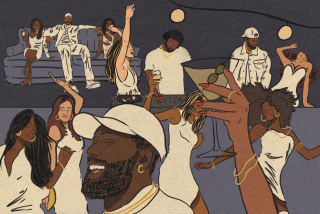Q&A: Nathan Rabin on his book about Juggalos, Phisheads and fandom
A decade or so ago, Nathan Rabin’s older sister went to Israel on a trip with a youth group. At the time she was a fan of thoughtful folk musicians like Indigo Girls and Dar Williams, but her roommate there listened to Celine Dion — and only Celine Dion.
“The first four months were really agonizing for my sister,” Rabin said. “But then she cracked. She went from ‘I hate Celine Dion’ to ‘Celine Dion is my favorite artist of all time.’”
A former writer for the Onion newspaper’s A.V. Club and author of several books, including “The Big Rewind: A Memoir Brought to You by Pop Culture,” Rabin undergoes a startlingly similar transition in his new book, “You Don’t Know Me but You Don’t Like Me: Phish, Insane Clown Posse, and My Misadventures with Two of Music’s Most Maligned Tribes” (Scribner: 272 pp., $16 paper). It recounts the two years he spent traveling the country with a pair of groups he says many people love to hate: the jam band Phish and the ghoulish rap group Insane Clown Posse, each of which has cultivated “a vast, intensely loyal grass roots following despite being alternately ignored and mocked by the mainstream,” he writes.
To understand how they did it, Rabin embedded himself among Phishheads and Juggalos (as face-painted ICP fans refer to themselves) at concerts and conventions, in parking lots and cop cars. And by the end of his journey he’d become — almost — one of them.
Rabin spoke to us ahead of his appearance Thursday night at L.A.’s Meltdown Comics.
Detractors speak about both of these bands in very dramatic terms: “ICP inspires violence and underage sex! The members of Phish are dirty hippies!” But did you ever worry that you might simply get bored spending so much time with them? Phish plays long shows.
You’re talking to somebody who’s made his life’s work evangelizing on behalf of stuff that often is considered not just bad, but unendurable. At the A.V. Club I wrote about cinematic flops like “Ishtar.” So I was scared and I was anxious; I didn’t know at first how I was going to write about this music. But I was never bored.
You warmed up slowly, though.
It was a subtle thing. The first summer I spent following Phish, the songs just kind of washed over me. But I don’t think I was really listening. There’s a big difference between hearing and listening. Hearing is just the physical act of something being processed; listening is much more involved and much more satisfying. That’s where I had my breakthrough and found the joy and the emotion in Phish’s music.
And Insane Clown Posse?
Same thing: When I started really listening, there was so much depth and richness and humor and gravity that came alive. And also when I started really listening to the Juggalos and engaging with them on an emotional level.
In the book you seem maybe more interested in the Juggalos than in ICP itself.
Before this book I wrote a book with Weird Al Yankovic [“Weird Al: The Book”], and half the time I was with him [at shows], I was looking at the crowd. I remember there was this woman next to me just staring at him; I’m not sure she blinked for the entire 2 ½ hour show. And she was mouthing along with every single word of every single song. I’m really fascinated by the culture of fandom — this obsession that people have with music in particular.
Did hanging out with those fans change how you think and write about music?
It made me think about the idea that to be a worthwhile cultural observer, you need to be removed from what you’re writing about. In our culture there’s this innate skepticism about people who are compassionate about anything — like, “Why are you so worked up about this?” And I think I came to let go of that. There’s nothing wrong with passionately loving something.
More to Read
Sign up for our Book Club newsletter
Get the latest news, events and more from the Los Angeles Times Book Club, and help us get L.A. reading and talking.
You may occasionally receive promotional content from the Los Angeles Times.







